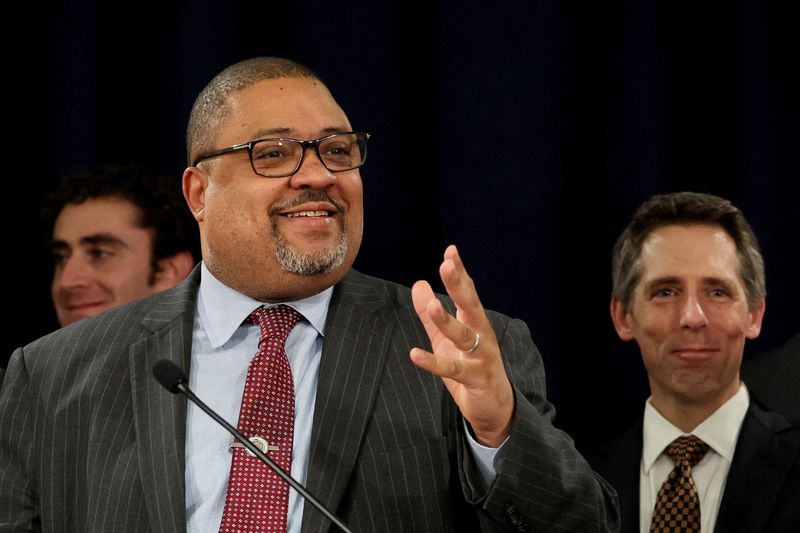By Luc Cohen
NEW YORK (Reuters) – Just over a year after taking office as Manhattan District Attorney, Alvin Bragg took a career-defining gamble: charging a former U.S. president with crimes using an untested legal theory.
The roll of the dice paid off on Thursday, when a jury found Donald Trump guilty on all 34 counts he faced of falsifying records to cover up hush money paid to porn star Stormy Daniels – a monumental verdict that could upend the presidential election, in which Trump is the Republican candidate.
The conviction goes a long way toward securing Bragg’s legacy as a bold prosecutor unafraid to apply the law to one of the most powerful people in the country.
But it also means Bragg, a Democrat who was present in the courtroom when the verdict was read, will remain a prime target for rhetorical attacks by Trump and his Republican allies who say the charges were politically motivated.
“We had a D.A. who is a failed D.A.,” Trump said in a speech on Friday following the verdict. “Crime is rampant in New York … and Bragg is down watching a trial on what they call crimes.”
Bragg’s office said on May 30 that overall crime in Manhattan was down 8% over the past two years, with murders and shootings falling 27% and 45%, respectively.
Bragg, 50, took over as District Attorney in January 2022 after handling public corruption cases as a federal prosecutor and at the New York state attorney general’s office. A Harvard Law School graduate and the first Black person to serve as Manhattan’s district attorney, Bragg says he decided to become a lawyer after having guns pulled on him six times while growing up in Manhattan’s Harlem neighborhood – three of those times by police.
During his campaign, he pledged to refrain from prosecuting some minor offenses and to seek reduced sentences for some crimes. He also highlighted his work overseeing a 2018 lawsuit that forced Trump’s namesake foundation to dissolve.
In late 2022 he won a conviction of the Trump Organization on charges of orchestrating a 15-year tax fraud, which were brought by his predecessor, Cyrus Vance. Trump personally was not charged in the case.
Bragg also inherited Vance’s probe into whether Trump had misrepresented the values of his real estate properties. Bragg declined to bring charges in that case, but secured an indictment in the hush money case in March 2023.
Bragg’s case has faced skepticism even from critics of Trump, who argued it appeared politically motivated and was not as serious as three other criminal cases Trump faces stemming from his efforts to overturn his 2020 election loss and his handling of classified documents after leaving the White House. Trump has pleaded not guilty to all charges.
“He made a political decision. Bragg may have won the battle, for now, but he may have lost the political war,” Mitt Romney, a Republican Senator who twice voted to impeach Trump, told The Atlantic journalist McKay Coppins after the verdict.
When asked on Thursday about the criticism the case had received, Bragg said, “Many voices out there. The only voice that matters is the voice of the jury, and the jury has spoken.”
Bragg’s office declined to comment. Trump’s lawyers did not respond to a request for comment.
‘I DID MY JOB’
The trial is likely the only one that Trump will face before the Nov. 5 election, in which polls show him neck-and-neck with Democratic incumbent President Joe Biden.
The case employed a novel legal theory. Prosecutors said Trump falsified business records to conceal a conspiracy to boost his candidacy for the presidency in 2016 by unlawful means, including a $130,000 payment to Daniels for her silence before the election about a sexual encounter she says they had a decade earlier – which Trump denies.
According to a book by Mark Pomerantz, a former prosecutor in the office, Bragg’s predecessor Vance in part declined to bring charges because doubts arose as to whether state felony charges could be brought over a campaign for federal office. Pomerantz resigned in February 2022 after Bragg declined to bring charges in the case over Trump’s business practices.
New York State Attorney General Letitia James sued Trump over his real estate company’s business practices, resulting in Trump being ordered to pay $454 million in fines and penalties earlier this year. Trump is appealing.
Trump’s lawyers in the hush money case have argued that state election law does not apply to federal elections – a claim which is likely to be central to their appeal of the verdict after Trump is sentenced on July 11.
While the case is unprecedented, Bragg’s theory has already been backed by two judges: Justice Juan Merchan, who oversaw the trial, and U.S. District Judge Alvin Hellerstein, who denied Trump’s bid last year to move the case from state court to federal court.
Bragg has also dismissed Trump’s claims that the case was politically motivated, calling falsification of business records a core concern in Manhattan – home to Wall Street and the self-professed business capital of the world.
“I did my job,” Bragg told reporters on Thursday after the conviction. “These are the kinds of cases I’ve done personally, and it’s a hallmark of the tradition of this office that I’m proud to lead.”
(Reporting by Luc Cohen in New York; Editing by Noeleen Walder, Jonathan Oatis and Daniel Wallis)


